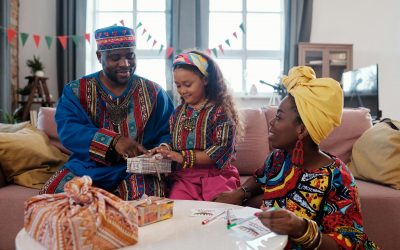Kwanzaa begins on 26 December and lasts for seven days. It is a celebration of community, family and culture, established to help African Americans reconnect with their African roots and heritage.
The celebration was created in 1966 by Dr Maulana Karenga, professor and chairman of Africana Studies at California State University, in the wake of the 1965 Watts Rebellion. Dr Karenga researched African harvest celebrations and combined aspects of several different celebrations, such as those of the Ashanti and those of the Zulu, to form the foundation of Kwanzaa. The name Kwanzaa is derived from the phrase matunda ya kwanza which means first fruits, or harvest, in Swahili.
Karenga was a major figure in the Black Power Movement of the 1960s, and his goal in creating Kwanzaa was to give Black people an alternative to the exceedingly commercialised Christmas holiday and provide an opportunity to instil pride, create a sense of identity, purpose, and direction for people of African ancestry.
The seven principles of Kwanzaa
There are 7 Principles and 7 Primary Symbols that emphasise a unique set of values and ideals during the 7 days of Kwanzaa… also spelt with 7letters. Each day a different principle is discussed, and each day a candle is lit on the kinara (candleholder).
During the week of Kwanzaa, families and communities come together to share a feast, honour the ancestors, affirm the bonds between them, and celebrate Black and African culture. Each day they light a candle to highlight the principle of that day and to breathe meaning into the principles with various activities, such as reciting the sayings or writings of great black thinkers and writers, reciting original poetry, African drumming, and sharing a meal of African diaspora-inspired foods.

Principle: Umoja (Unity)
Premise: To strive for and maintain unity in the family, community, nation and race
Project: Resolve to do one activity every week as a family in 2010 — family board game night; movies and pizza; or a stroll around the neighbourhood to stay active, fit and healthy.
Principle: Kujichagulia (Self-Determination)
Premise: To define ourselves, name ourselves, create for ourselves and speak for ourselves
Project: Invite each member of the family to share one positive word to describe themselves, and then ask other family members to chime in. Combine these words to create an inspiration board that can be hung where everyone can see it and reflect on it.
Principle: Ujima (Collective Work and Responsibility)
Premise: To build and maintain our community and make our brother’s and sister’s problems our problems and to solve them together.
Project: Choose one charitable act to participate in as a family: working at a food bank, walking in a fundraising marathon, writing a group letter to our president to express an opinion or support for an issue.
Principle: Ujamaa (Cooperative Economics)
Premise: To build and maintain our own stores, shops and businesses and to profit from them together.
Project: Seek out a local black-owned business to frequent; if none are available, search for online businesses that you can support.
Principle: Nia (Purpose)
Premise: To make our collective vocation the building and developing of our community in order to restore our people to their traditional greatness.
Project: Consider volunteering at a local Boys and Girls Club or other organisations that focus on mentoring young people.
Principle: Kuumba (Creativity)
Premise: To do always as much as we can, in the way we can, in order to leave our community more beautiful and beneficial than we inherited it.
Project: Resolve to gather a group of volunteers to clean up a local park area; enlist the help of family to start a flower or organic vegetable garden; seek out arts programs, community theatres, church programs, and other options for seniors and young people that encourage our creativity to flourish.
Principle: Imani (Faith)
Premise: To believe with all our heart in our people, our parents, our teachers, our leaders, and the righteousness and victory of our struggle.
Project: Keep our history alive by passing it along. Invite young people to videotape oral histories of their grandparents’ lives, purchase books that celebrate our contributions to this country and the world, or challenge your children to write the best essay on a black leader they admire and reward their efforts.
Red, Black and Green
The colours of Kwanzaa are a reflection of the Pan-African movement representing “unity” for peoples of African descent worldwide: Black for the people, red for the noble blood that unites all people of African ancestry, and green for the rich land of Africa.






Leave a Reply